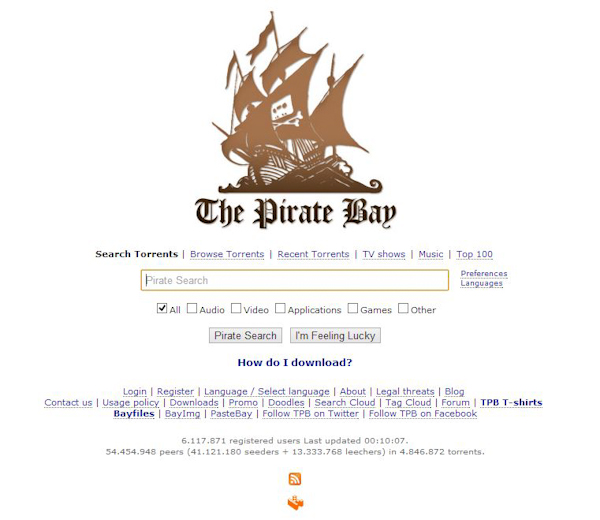Photo by: Nick Conley
Pirates are no longer swashbuckling, peg-legged plunderers of the sea.
Today’s most prevalent pirates surf the Internet, downloading free music, TV shows and movies and look like most adults under 30, as a new study from Columbia University suggests.
According to the study, “Copy Culture in the U.S. and Germany,” nearly half the population of the United States, 46 percent, has copied, shared or downloaded music, movies and TV shows for free. Among young adults under 30 years of age, about 70 percent do the same.
Although this free copying and downloading of media, deemed “Copy Culture” by the study, is widespread across the country and evident on Oklahoma Christian University’s campus, little to none of it is actually legal.
“It’s obviously a crime,” John Hermes, Oklahoma Christian’s chief technology officer, said of online piracy. “It’s a violation of copyright law. Whether they understand it as a crime or believe it to be – that’s kind of irrelevant.”
Hermes said he thinks most people do not realize that they are committing online piracy, or if they do, then they see it as taking from the entertainment industry that already has enough money.
“It’s a very emotionally charged thing,” Hermes said. “People think we are just feeding the coffers of the movie and recording industry, but it’s still a crime.”
According to Hermes more people need to be educated as to what a copyright violation is.
“There are individuals who are probably very big abusers of copyright,” Hermes said. “And there are others that are maybe abusing copyright and don’t really understand that they are abusing copyright.”
Jacob Dale, a junior at Oklahoma Christian, said piracy is as rampant as it is because of the technology.
“I think the reason why there are a lot of problems with piracy is because the music companies and TV networks haven’t caught up with where we are right now with the Internet,” Dale said. “Everything is readily available through piracy, but they haven’t caught up to that.”
Websites like Netflix and Hulu Plus allow users to instantly stream unlimited TV shows and movies on computers, tablets and smartphones, but for a price. Many college students don’t want to pay for their entertainment.
“To be flippant, I would say, well, I don’t have the money to buy the nice house I want either, but it doesn’t mean I’m going to go steal someone else’s,” Hermes said concerning paying for entertainment. “There are pretty inexpensive sources to get large quantities and large varieties of content.”
Even though Netflix, Hulu and other similar sites can boast hundreds and thousands of titles to choose from, they still do not have every TV show or movie. Many times their selection is not what the consumer is looking for.
“I would love it if there was a perfect service that provided me with all the music I wanted, all the TV shows I wanted, all the movies I wanted and it had an unlimited selection, and then I could pay for it,” Dale said. “But we’re just not there yet.”
Hermes agreed.
“I’m hoping as technology changes that the movie industry and the recording industry will get better about understanding the desires and needs of the customer,” Hermes said.
Oklahoma Christian, through a third party, monitors and blocks websites that appear to be in violation of copyright laws; this includes most peer-to-peer file sharing sites.
“It’s not a perfect technology, because there are lots of things that are not blocked,” Hermes said of the filter. “There are thousands of sites created every day. Just because it’s online doesn’t make it legal.”
Until the copyright infringement websites are found and classified and the database is updated, it is possible to get around the filter. Additional websites that are not in violation are sometimes blocked as well, due to imperfect classification software.
“It’s an imperfect technology in that a lot of those sites are subdomains of larger domains,” Hermes said. “So there are legitimate sites and copyright infringement sites in the same general high-level domain.”
Dale said Oklahoma Christian’s filter isn’t going to stop the people who really want something.
“It’s going to stop the people who might not know how to do it right,” Dale said. “If you really want it you can find it.”
If a student finds a website that appears to be mistakenly blocked on the school’s network, they can send a request for the site to be reviewed. Hermes reviews the websites himself.
“We spend some time if we get requests from students to look at a site,” Hermes said. “We’ll go look at it and we classify that domain until they fix it.”
Compared to other universities, Hermes says Oklahoma Christian is “typical.”
“I wouldn’t say we are a larger or smaller abuser,” Hermes said. “I would just say we are pretty typical of anybody. It’s more of a generational thing than a university-to-university thing.”
Dale said there are definitely two different perspectives based on age.
“Those of us who have grown up with the Internet all around us, we just see the world differently,” Dale said. “Everyone is connected. Obviously things are more available.”
Sophomore Josh Rodman said that even with the digital entertainment widely available at a simple search, if you are not paying for it, then it is stealing.
“Our values say that it is wrong,” Rodman said. “Morally it’s still wrong.”
Despite some complaints, these policies are sure to remain a part of campus life.
“Sites you don’t have to pay for are obviously copyright infringement sites,” Hermes said. “So as long as the copyright rules are what they are, whether I am in favor of them or not, that’s what we need to abide by.”












Be First to Comment